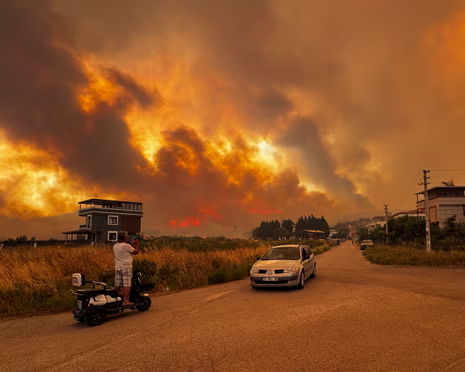Izmir, Turkey: Wildfires raging across Turkey’s western Izmir province have claimed the lives of two individuals, as high winds continue to fan the flames and complicate firefighting efforts. The blazes, which have been active for over a week, have forced evacuations and cut off major transport routes.
The latest casualty was a backhoe operator, Ibrahim Demir, who died while battling a fire in the Odemis district. This follows the death of an 81-year-old bedridden man in the same area, who perished when his home was engulfed by the flames.
While Turkey has largely been spared the recent heatwaves that have impacted other parts of Southern Europe, the country is grappling with the severe effects of a long-term drought exacerbated by climate change. This has created extremely dry conditions, making the landscape highly susceptible to wildfires.
Another significant fire is actively burning near Cesme, a popular resort town west of Izmir, forcing the evacuation of three additional villages. The strong, shifting winds have made it incredibly challenging for firefighters to bring the blazes under control, causing them to spread rapidly. The intensity of the fires even led to the closure of the main highway connecting Izmir, Turkey’s third-largest city, with the affected areas.
In both Izmir and Odemis, a substantial force of “nine planes, 22 helicopters, and 1,100 vehicles are intensively fighting the fires.” However, the persistent strong winds continue to pose a major obstacle. While the Cesme fire was reported to be under control by early Friday, July 4, 2025, efforts continue on the other active fronts.
Authorities have indicated that some of the fires, including those previously brought under control, may have been sparked by power cables. Investigations into the causes of these fires are ongoing. Over the past week, more than 600 fires have been reported across drought-hit Turkey, with over 50,000 people evacuated, primarily in the Izmir area and from the southern province of Hatay. The extent of the burnt land has more than doubled since Monday, with over 49,652 hectares ravaged so far this year.

























